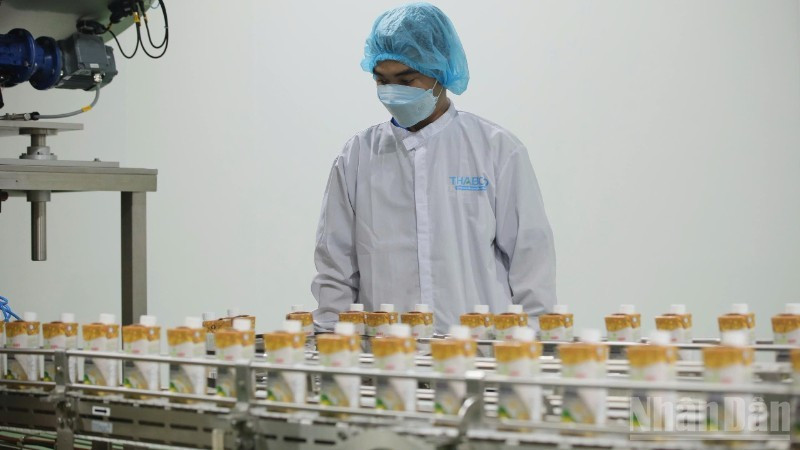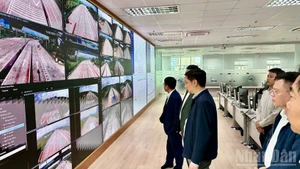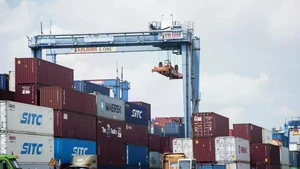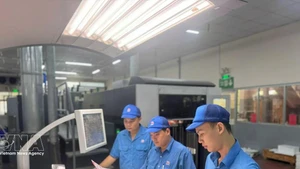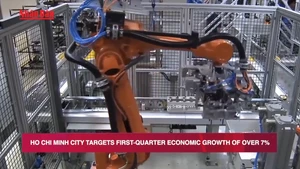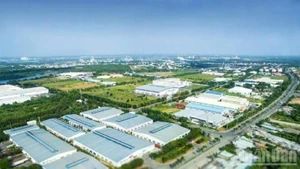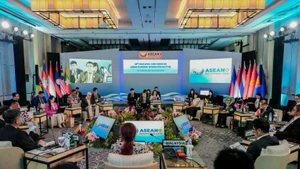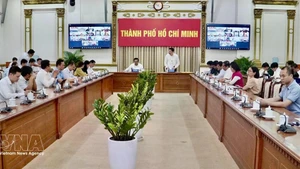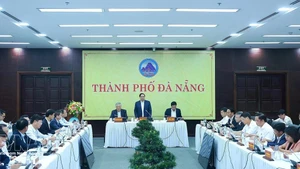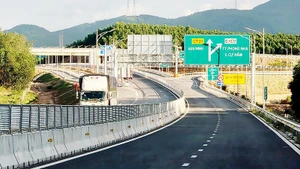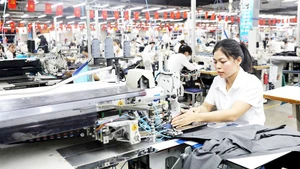Key processing sectors have emerged in line with the region’s strengths, such as fisheries (tra fish), rice, fruit (durian, mango, dragon fruit, longan, jackfruit), and lotus. Among these, the province has over 200 rice processing enterprises with a total capacity of 4.5–5 million tonnes per year, 25 fruit processing enterprises with a total capacity of about 700,000 tonnes per year, and nearly 48 seafood processing enterprises with a capacity of around 640,000 tonnes per year.
Abundant raw materials
To secure an outlet for local agricultural products and create jobs for women in her hometown, Nguyen Thi Minh Thy, Director of Bac My Thuan Production Trading Services Co., Ltd. in An Huu Commune, Dong Thap Province, left the city to return home and start a business in dried fruit. Through persistence and tireless effort, she successfully launched a line of soft-dried fruit products under the BamoFood brand.
Nguyen Thi Minh Thy said: “On one of my visits home, I saw many ripe mangoes falling to the ground, and I remembered the dried mango and banana snacks my grandmother used to make. I peeled and dried some mangoes and gave them to relatives and friends. Everyone loved them. That gave me the idea of producing soft-dried mangoes so that more people could enjoy them, and to bring Hoa Loc mango to a wider market. When I received positive feedback and large orders, I decided to ramp up production.”
Recognising the advantages of soft-dried mango, she invested in machinery, technology and set up a production workshop. Her products contain no sugar, no artificial colouring and no preservatives. After several ventures, she accumulated practical experience and knowledge from experts, improving the quality and design of her products, which have since attracted larger orders.
After her dried mango success, she experimented with drying bananas, soursop, pineapple, dragon fruit and more, all of which were well received by the market. Today, her company produces eight types of soft-dried fruit, including Hoa Loc mango, banana, guava and dragon fruit. Of these, Hoa Loc mango and dragon fruit are the company’s key products. Each year, the company supplies around 50 tonnes of dried fruit to the market, equivalent to about 500 tonnes of raw fruit.
Thabico Tien Giang Food Industry JSC is one of the most notable enterprises in agricultural processing for export in Dong Thap. Each year, the company processes and exports tens of thousands of tonnes of agricultural products.
Nguyen Minh Tuan, the company’s Director, explained that advanced agricultural processing is a specialised sector, requiring high technology, strict quality control and demanding customers, while facing fierce price competition from Asian and South American producers. However, the company is clear that if Viet Nam’s agricultural products are to move beyond raw exports and reach high-standard, sustainable markets, then serious investment in processing technology is essential.
Currently, Thabico Tien Giang operates a complete IQF (Individual Quick Freezing) processing and freezing line, enabling the processing of 60,000 tonnes of produce annually while preserving flavour and nutritional value.
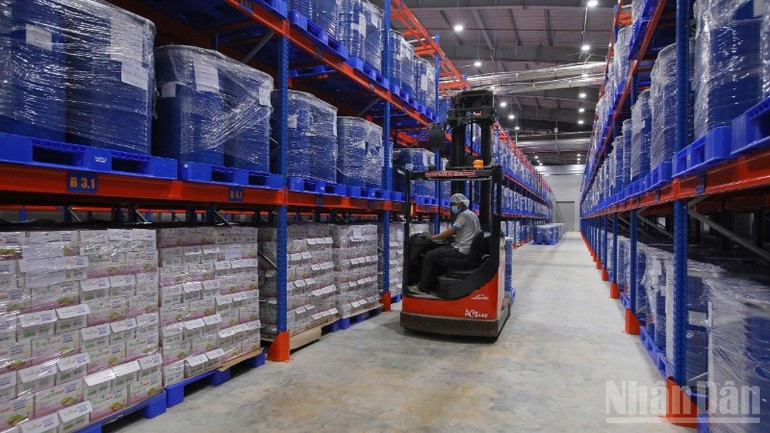
For cold-dried vegetables, root crops and fruit, the company applies Dutch technology, with a capacity of 4,500 tonnes per year. For concentrated fruit juice, it uses Italian technology that recaptures aroma during evaporation, ensuring the highest quality, with a capacity of 10,000 tonnes per year.
Looking ahead, Thabico Tien Giang plans to focus on developing raw material zones to ensure traceability, low-pollution farming, moderate organic fertiliser use and efficient water management. It will also invest in energy-efficient processing technology, minimise waste and optimise by-products, while maintaining social responsibility towards farmers and local communities.
Prioritising agricultural processing industry
The province has actively sought investment and created an attractive environment for agricultural processing enterprises. Numerous investment promotion conferences have been held to showcase local potential, alongside preferential policies on land, credit and workforce training to attract investors.
According to Director of Dong Thap Department of Agriculture and Environment Le Ha Luan, after the merger, the province gained an advantage in wide-scale planning, with dozens of industrial parks and processing clusters strategically located and abundant clean land reserves. Hundreds of projects are currently calling for investment, creating strong appeal for businesses. Thanks to this favourable environment, many large-scale, deep-processing projects have been implemented in the province. Preliminary processing facilities and cold storage centres for agricultural products at Sa Dec, Thuong Phuoc and Go Cong ports are contributing to the formation of a regional logistics and processing hub.
The commissioning of processing plants has had a highly positive impact on both production and consumption. First and foremost, processing plants ensure more stable outlets for local produce, reducing the need for seasonal “rescue” campaigns.
One notable example is Thabico Tien Giang’s fruit and coconut processing plant, covering 4.8ha with a capacity of 120,000 tonnes per year, applying modern IQF freezing technology.
In addition, major enterprises already present in the province include: Go Dang, Van Duc, Vinh Hoan, Vinh Hoan Collagen, Hung Ca, Phat Tien (fisheries); Chon Chinh, Vinarice, Co May, Ricegrower, Viet Hung (rice); T&H, Chu Chin, Westernfarm, Song Nhi, Ecolotus, Sen Dai Viet, Ba Tre (fruit and lotus).
According to Le Ha Luan, thanks to processing development, the proportion of processed agricultural products has increased, reducing the export of low-value raw goods. Product value has been enhanced and designs diversified. Many by-products once considered waste, such as tra fish fat and rice bran, are now processed into high-value exports like fish oil, rice bran oil and collagen. High-quality processed products have expanded consumption markets for local produce, including access to the most demanding ones.
Notably, many enterprises have invested in modern, advanced technologies to improve product quality and international competitiveness. These technologies include: IQF quick-freezing, irradiation, heat treatment, vacuum sealing and modified atmosphere packaging for preserving fresh produce; colour separation, automatic grading and optical rice polishing in milling; and biofilm preservation for fruit combined with ethylene absorption to extend shelf life.
Thanks to the application of modern technology, processed agricultural products are now more diverse and meet the standards of demanding markets such as the US, the EU, Japan and the Republic of Korea. Processing has not only reduced the pressure of seasonal consumption but also motivated enterprises and farmers to invest in higher-quality raw material zones, moving towards the formation of efficient and sustainable closed value chains.
Director of Dong Thap Department of Agriculture and Environment, Le Ha Luan
To further advance agricultural processing and attract more investment, Dong Thap Province plans to become one of the leading agricultural processing hubs in the Mekong Delta. Its strategy includes creating an open investment environment; attracting deep-processing, high-tech projects; developing sustainable raw material zones; and investing in logistics infrastructure for processing; and enhancing human resources.
